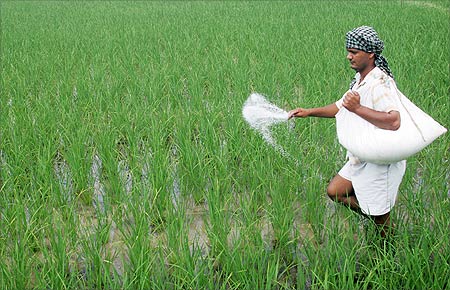 | « Back to article | Print this article |
 Last year Finance Minister Pranab Mukherjee experimented with the direct transfer of subsidies for a few agricultural fertilisers excluding urea.
Last year Finance Minister Pranab Mukherjee experimented with the direct transfer of subsidies for a few agricultural fertilisers excluding urea.
This has been found to be very successful in ensuring that the benefits are accrued by the actual farmer who ultimately uses the fertilisers and not the intermediaries.
Emboldened by the success of the experiment, the finance minister has extended the concept to a few more products.
Subsidy proposal: This Budget
Budget 2011-12 proposes to include urea which is the most consumed fertiliser by volume, under the direct subsidy route under the Nutrient Based Subsidy (NBS) scheme.
There is also a proposal to shift kerosene and LPG to the direct transfer system for the below poverty line people. This is a welcome measure.
The reason is that today in the name cross subsidy everyone kerosene and LPG are fixed at a lower price for all consumers.
This in turn forces the price up for the commonly used fuel -- petrol. For the common man of India the money spent on petrol is more that the benefit from the subsidy on kerosene of LPG.
The scenario also leads to a lot of kerosene being used by commercial establishments by manipulating the distribution system.
Going the direct subsidy route, the prices of kerosene and LPG will go up in the market, but the extent of rise will not be as high as when the subsidy is given to everyone.
Housing loan interest subvention
The finance minister has extended the limit for the interest rate subsidy for housing loans from Rs 10 lakh (Rs 1 million) to Rs 15 lakh (Rs 1.5 million) for properties worth up to Rs 25 lakh (Rs 2.5 million).
This again is a welcome measure. The interest subsidy remains at the same 1 per cent.
The possibility to own a house is increased now for the common man.
Agricultural loans interest subvention
The last budget had given a provision for 2 per cent interest subvention to farmers who borrow short term crop loans and pay back on time.
The response has been good during this year. Based on this the finance minister has not only extended the scheme but has increased the interest subvention to 3 per cent.
This trend is a sharp and welcome shift from foregoing / writing-off farm loans, which created a wrong precedence and did not motivate even farmers who had the money to repay the loan.
Overall subsidy budget
The finance minister has fixed a limit of Rs 23,000 crore (Rs 230 billion) for the fuel subsidy which is lesser than the previous year.
But with the crude prices rising to $120/gallon, this will not be enough. However, the extend of benefit (actual reduction in the subsidy paid out) due to the implementation of the direct payout of the subsidies needs to be seen.
Overall the shift in system by going for direct transfer of subsidy is a step in the right direction for the entire society.